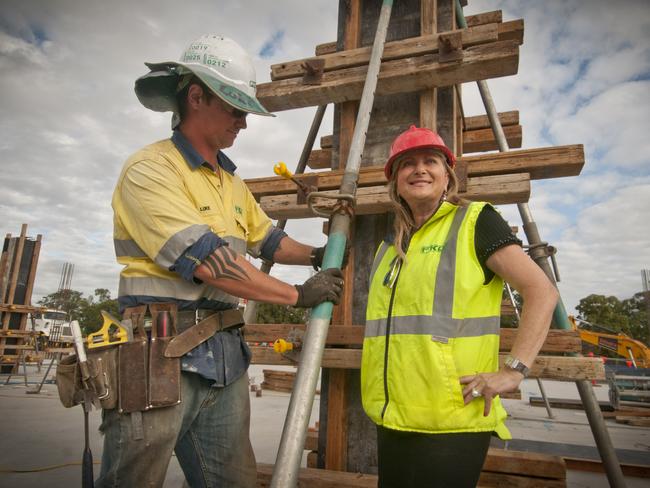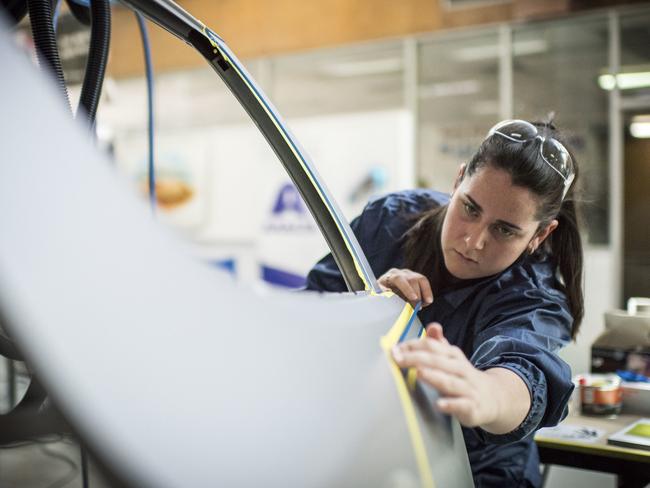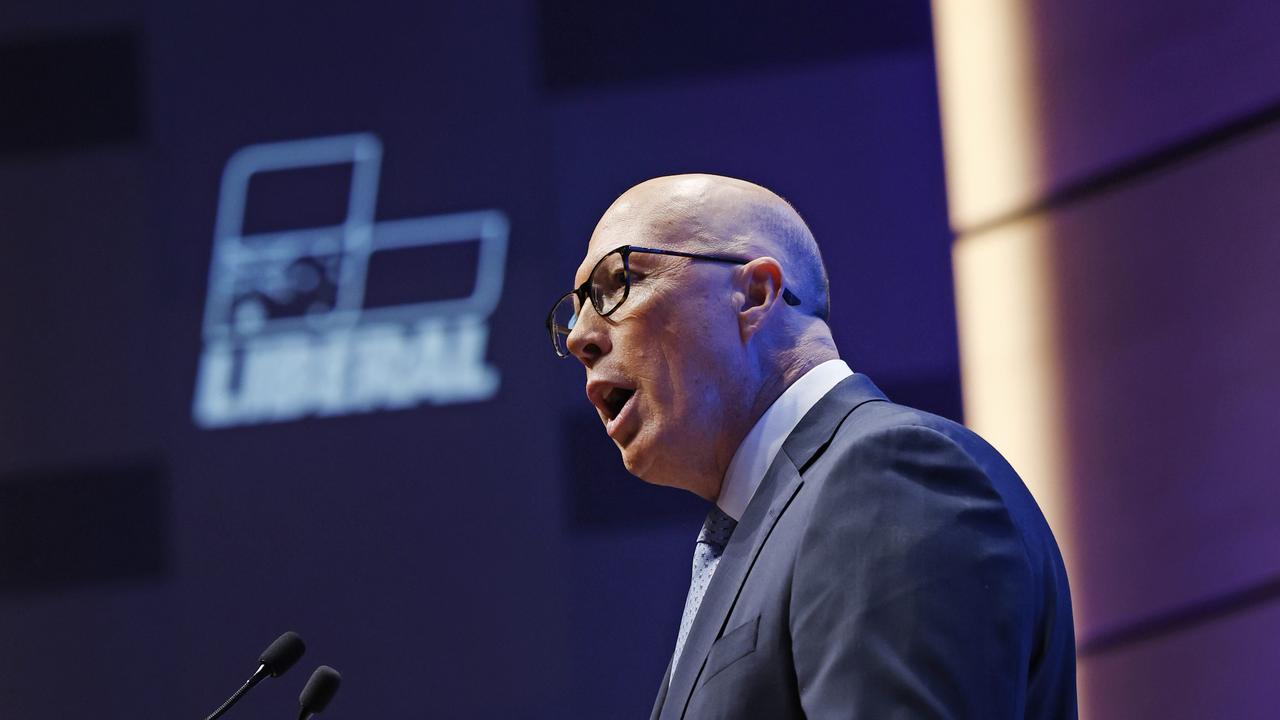Industry experts, public calling for more funding for school career counsellors
Stop telling your kids they can be whatever they want to be. They probably can’t. Instead, young people are urged to think about the skills of the future.

Careers
Don't miss out on the headlines from Careers. Followed categories will be added to My News.
Parents who tell their kids they can “be whatever they want to be” are helping create a skills mismatch in the job market, leading to calls for increased career guidance in schools.
Generation Z are twice as likely to be unemployed as the average Australian, with many continuing to pursue saturated or automatable sectors rather than skills in demand.
Career Development Association of Australia vice president Carolyn Alchin said young people needed to be realistic about their careers.
“Since the 1960s parents have been saying ‘you can do whatever you want to do’ but that’s not actually true,” she said.
“I cannot turn around and become an astronaut tomorrow just because I try.”
**SCROLL DOWN FOR THE LIST OF WORKERS IN DEMAND**
She advised young people to think about their strengths and values as well as their context, location and the types of careers least likely to be automated, such as those that deal with people.
Ms Alchin said university students were changing courses at a much higher rate than 10 years ago, suggesting poor decision making prior to starting their studies.

Gender discrimination at work increasing
New research from the NSW Department of Industry and Year 13 revealed most young people (aged 15 to 21) wanted to work in arts and entertainment, with 24 per cent saying it was among their industries of choice.
This was despite forecasts from the Australian Department of Jobs and Small Business that just 4600 new jobs would be created for arts and media professionals and performing arts technicians between 2018 and 2023 — about 0.5 per cent of all new jobs.
Even more worryingly, 45 per cent of young men and 9 per cent of young women struggled to even identify careers that interested them.
Sarina Russo, managing director of Sarina Russo Job Access, said more funding was needed for career counsellors.
“Too many teachers have been expected to also act as career advisers, which may not be their skill set because they may lack intimate knowledge of the jobs market and building job-ready capabilities,” she said.

In 2014, research by the Career Industry Council of Australia revealed half of schools with at least 1000 students spent less than $3 per student on career education each year.
Ms Alchin said funding had only worsened since then.
A poll of more than 1700 people by SEEK revealed one in six (16 per cent) did not have access to a career counsellor when they were in high school and more than half (53 per cent) believed more money should be invested in counsellors as they were “invaluable”.
National Electrical and Communications Association chief executive Suresh Manickam said better funding could help address the shortage of young people choosing trades.
“There are careers that are oversupplied, such as lawyers and accountants, and there are careers that are under-supplied such as the trades,” he said.
“If we were talking about it properly there would be much better balance.”
Department of Jobs and Small Business data predicted just 1900 new jobs would be created for legal professionals in the five years to 2023, yet about 6300 people began undergraduate law degrees in 2018 alone, according to the Department of Education and Training.
DXC Technology director of human resources Cian Zoller said more career counselling could also solve skill shortages in science, technology, engineering and maths (STEM).
“At the moment, STEM is a nebulous concept that conjures up images of programmers and robot specialists,” he said.
“It is so broad that wanting to work in STEM is not as clear a career path as wanting to work in a law firm (for example).”
Social analyst David Chalke said career counsellors needed to guide people toward broad skills rather than specific careers as there were jobs that existed now that would not exist in 10 years and jobs that did not yet exist that would be created.
In May, the unemployment rate for people aged 15 to 24 was 11.8 per cent, compared to 5.1 per cent for the average Australian, according to the Australian Bureau of Statistics.

MAXINE MADE THE RIGHT CHOICE
Maxine Colligan had toyed with the idea of becoming a teacher before landing herself an apprenticeship painting cars — and she has not looked back.
The Sydneysider was not offered one-on-one career guidance at her Catholic all-girls school but a friend of a friend told her about the free pre-vocational course that started her on her trade path.
“After the course, my TAFE teacher suggested I attend an event designed to put employees in front of employers and within 15 minutes of being there I met a guy that worked for AMA Group … 10 minutes after that, he said ‘You have a job, you start on Monday’,” she said.
“There was such high demand (so) any chance that he had to pick up staff members he took.”
Ms Colligan is now nearing the end of her apprenticeship and is set to represent Australia in car painting at the WorldSkills “tradie Olympics” in Kazan, Russia in August.
She had already won Australia’s national WorldSkills event in Sydney and the Global Skills Challenge in Melbourne against international counterparts.
“If I hadn’t spoken to my friends about it, I wouldn’t have even known (a career in car painting) was a thing,” she said.
“People ask what I do for a job and when I say I’m a spray painter they say ‘isn’t that illegal?’ I don’t do graffiti! So many people have no idea what it is.”
Not-for-profit organisation WorldSkills Australia hopes to increase awareness of in-demand trades and vocational careers with a documentary following Australia’s team of Skillaroos as they compete in Kazan.
A crowd funding campaign will soon be launched on Kickstarter.

OCCUPATIONS WITH A NATIONAL SKILL SHORTAGE
Agricultural consultant/scientist
Airconditioning and refrigeration mechanic
Aircraft maintenance engineer
Arborist
Architect
Automotive electrician
Baker
Bricklayer
Butcher/smallgoods maker
Cabinet maker
Carpenter/joiner
Civil engineering professionals
Electrician
Fibrous plasterer
Glazier
Hairdresser
Mechanical engineer
Medical diagnostic radiographer
Metal fabricator
Metal fitter/machinist
Midwife
Motor mechanic
Optometrist
Panel beater
Pastrycook
Physiotherapist
Plumber
Vehicle painter
Veterinarian
Sheet metal trades worker
Sonographer
Stonemason
Surveyor
Wall and floor tiler
OCCUPATIONS WITH NO NATIONAL SHORTAGE
Accountant
Chef
Child care centre manager
Childcare worker
Early childhood teacher
Electrical engineer
Enrolled nurse
Medical laboratory scientist
Mining engineer
Painting trades worker
Podiatrist
Primary schoolteacher
Registered nurse
Secondary schoolteacher
Solicitor
Speech pathologist
Telecommunications trades worker
Welder
SOURCE: DEPARTMENT OF JOBS AND SMALL BUSINESS
FOR MORE EMPLOYMENT NEWS, READ THE CAREERS SECTION IN SATURDAY’S THE COURIER-MAIL, THE ADVERTISER, THE HERALD SUN AND THE DAILY TELEGRAPH


